Our Impact
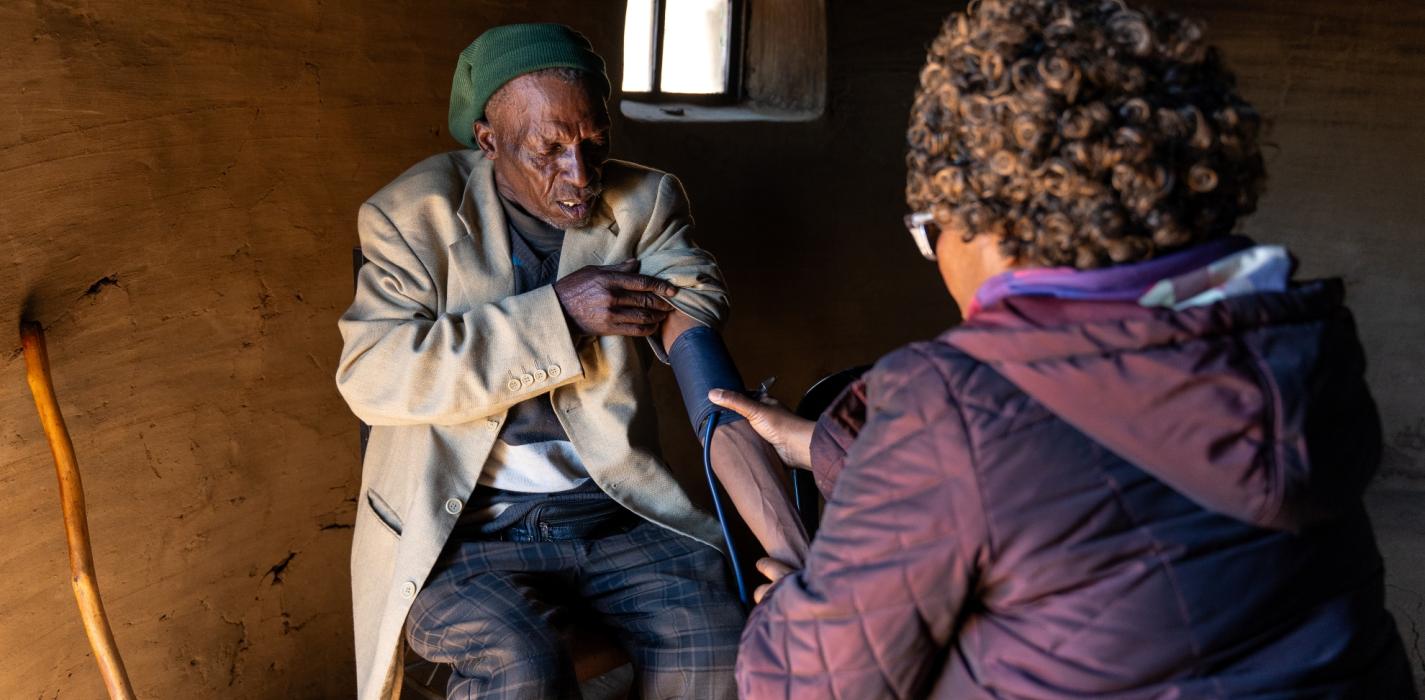
The first community-based Multi Drug Resistant Tuberculosis (MDR-TB) treatment program in Africa was established in 2007, by PIH Lesotho in partnership with the Lesotho National TB program. This program has since served as a model for effective Drug-Resistant TB care in Africa.
The building is structured around the disease; glass ceiling panels let in UV light, which kills TB bacteria, and ceiling vents refresh the air 12 to 15 times per hour to prevent the disease from spreading.
Improving Treatment And Care For DR-TB
Points of Care at Botšabelo
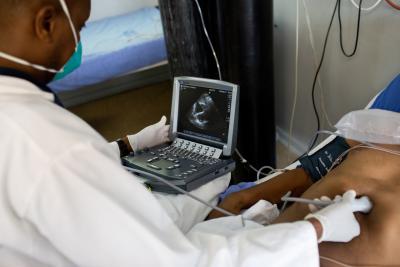
Dr. Ninza Sheyo examining MDR-TB patient at Botsabelo Hospital.
At outpatient departments (OPD), PIH has streamlined the diagnostic process by incorporating rapid molecular tests, ensuring timely and accurate diagnosis of DR-TB. These OPDs serve as the first point of contact for patients, providing them with personalized treatment plans to manage their condition effectively. For more severe cases, PIH’s in-patient care facilities, including High Dependency Units (HDU) and Intensive Care Units (ICU), offer specialized treatment for patients with advanced DR-TB. These units are equipped with state-of-the-art technology and staffed by highly trained medical professionals who manage complex cases requiring intensive medical intervention.
Post-TB Lung Disease
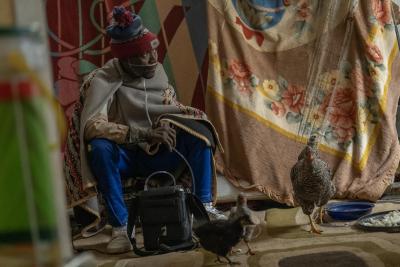
Kaizer Mahapa at home and feeding his chicken. He requires supplemental oxygen after suffering permanent lung damage from MDR-TB.
Post-Tuberculosis Lung Disease (PTLD) is a chronic respiratory condition affecting the airways, lung parenchyma, pulmonary vasculature, and pleura, often due to prior pulmonary tuberculosis or DR-TB. The high burden of Tuberculosis (TB) in Lesotho requires skilled healthcare providers to diagnose and manage PTLD. Many patients with PTLD have a history of TB or MDR-TB, making their lungs fibrotic and prone to complications.
PIH Lesotho is committed to holistic patient care beyond treatment completion, including continuous monitoring and essential services like oxygen support for severe PTLD patients. By identifying and implementing long-term solutions, PIH Lesotho aims to mitigate risks associated with PTLD and enhance the quality of life for TB survivors.
National Health Reform Model
In 2014, the Government of Lesotho in partnership with Partners In Health Lesotho launched a National Health Reform (“Reform”) to strengthen the primary health care system and improve maternal health, child health, HIV, and Tuberculosis (TB) outcomes, based on the successful model implemented in the rural clinics.
The Reform was piloted in all health facilities across four pilot districts: Berea, Leribe, Butha-Buthe, and Mohale’s Hoek.
The health reform systems-based approach led to significant improvements in service delivery and health system components with relatively modest investments, providing a replicable model for achieving Universal Health Coverage (UHC).
The Reform initiative has successfully strengthened Lesotho’s primary health care system, demonstrating that a holistic, systems-based approach can yield significant results. The decentralization of services from hospitals to local health centers and the professionalization of the VHW program were identified as critical drivers of improved service uptake and outcomes.
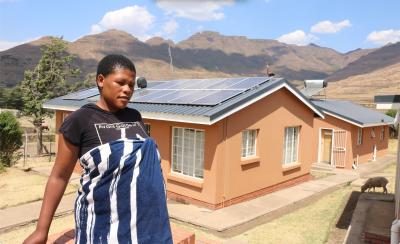
Makhauhelo Noko outside the maternal waiting home at Mpharane health center in Berea.
The Reform builds health system resilience and sustainability through three core strategies, summarized in Figure 1 below:
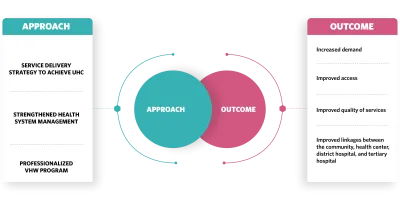
Summary of National Health Care Reform Core Strategies:
- Strengthen health care delivery to achieve universal health coverage with a focus on Maternal and Child Health, HIV and TB services as well as management of essential medicines and medical supplies.
- Strengthen health system management through District Health Management Team support to collect and use data for decision-making and conduct supportive supervisions and mentorship for the health facilities.
Laboratory Services
Total number of tests performed at PIH Labs is 41,744
Total number of tests performed at Ministry of Health facilities 44,406
Central Lab
PIH Lesotho has been working to improve the quality of patient care through building a robust, reliable, and timely laboratory system in PIH Lesotho-supported health facilities. The central laboratory is located at the Botšabelo MDR-TB Hospital, and initially it served only the PIH Lesotho-supported health facilities; Botšabelo DR-TB hospital and the seven RI health centers.
The central laboratory expanded its quality and quantity of services and included a range of tests including liver function tests, renal function tests, cardiac therapeutic drug monitoring, HBA1c, CRP, electrolytes, lipids, FBC, differentials, HIV viral load, MDR-TB, and XDR. The central laboratory test services expanded to include patients from government health facilities, including the Senkatana Center of Excellency for HIV and clinic, Oncology center, Occupational Health Clinic.
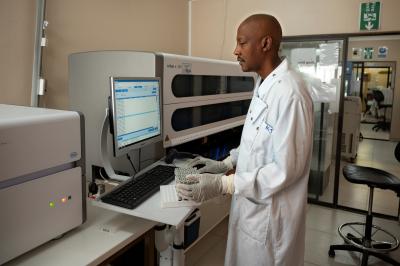
Mojakisane Ramoeletsi (Lab Technician) in the laboratory at Partners In Health’s Botšabelo Hospital in Maseru, Lesotho.
Mini Labs
PIH Lesotho established five mini labs in the rural clinics in Nohana, Nkau, Bobete, Lebakeng and Manemaneng. This initiative has significantly improved access to TB services for the communities served, reducing the result turnaround time from over three days to just two hours. Additionally, PIH Lesotho uses these mini-labs to monitor the viral load of HIV-positive pregnant and lactating women and to conduct timely testing of HIV-exposed infants at PIH Lesotho sites.
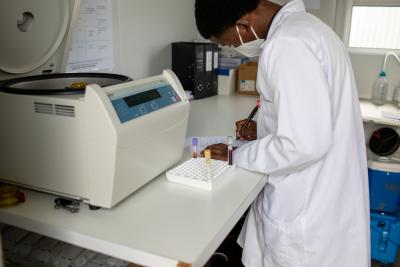
Ts’epo Tsumane (Lab Technician) works at the mini-lab at Bobete Health Center in Lesotho.